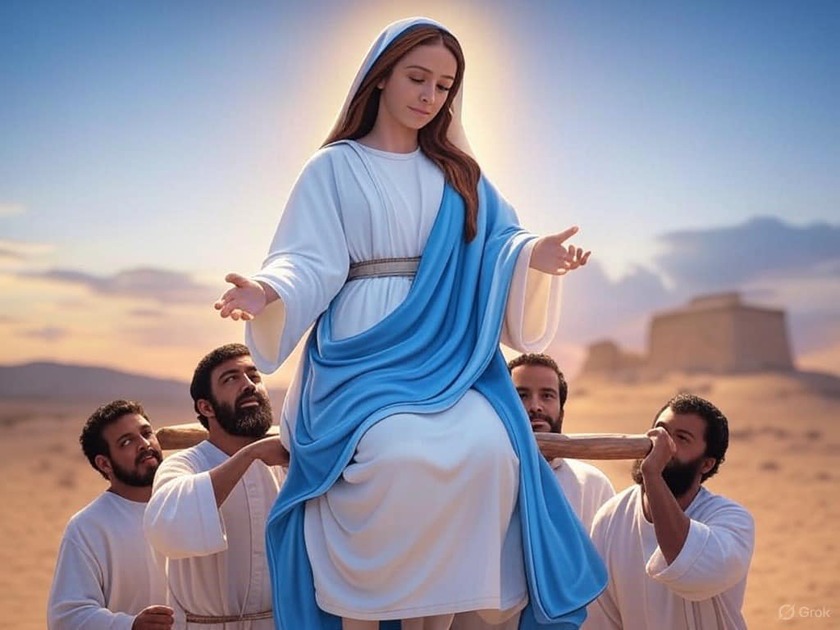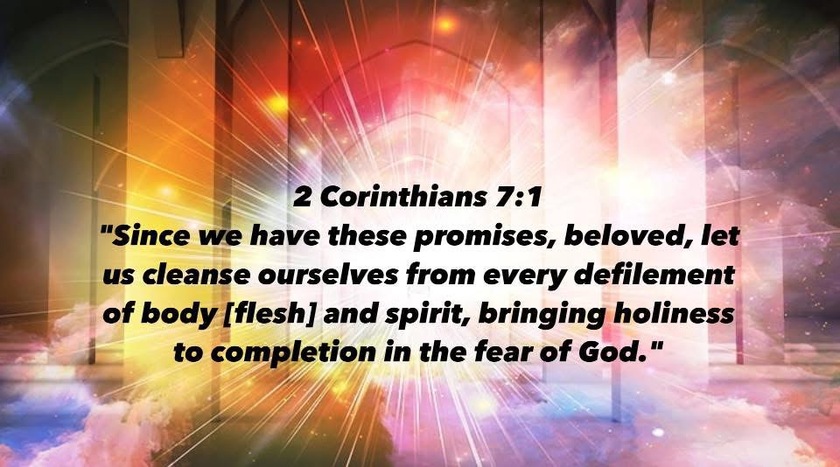Idolatry Wearing a Prettier Mask
Luke 11:27-28
As he said these things, a woman in the crowd raised her voice and said to him, "Blessed is the womb that bore you, and the breasts at which you nursed!" But he [Jesus] said, "Blessed rather are those who hear the word of God and keep it!"
The woman in the crowd is praising Mary, which makes sense given the cultural reverence for motherhood and the miraculous nature of Jesus’ birth. Maybe she was a first century feminist. Who knows.
And it's important to notice what Jesus doesn't say. He doesn't dispute the claim about Mother Mary's blessedness. But in a sense, he goes back to the same narrative that he shared with the sisters Martha and Mary (in Luke 10:38-42). He elevates the conversation with him itself. He points to a blessing that’s available to everyone; hearing God’s word and putting it into action.
It’s almost as if he’s saying, "don’t miss the bigger picture, true blessedness isn’t just tied to me biologically; it’s about a relationship with God through obedience."
Jesus is redirecting the woman’s attention from a physical adoption, an earthly honor (his mother’s womb and breasts), to the spiritual priority, to the better part of hearing and obeying God’s word. One thing you'll never see in scripture is faith comes by the mother of God.
In fact, it explicitly says,
"Faith comes by hearing, and hearing by the word of Christ" (Romans 10:17).
In passages like Luke 11:27-28, Jesus himself seems to steer away from elevating Mary as the source of spiritual blessing, instead directing people to the word of God and obedience to it. Even when Mary is honored, like in the Magnificat (Luke 1:46-55), her role is portrayed as a faithful servant who points to God’s work, not as the origin or magnifying power of faith itself.
This fits with the broader biblical narrative where faith is consistently tied to God’s revelation, whether through His word, His promises, or His Son, rather than any human figure, even one as significant as Mary. And its a shame to see many have become idolatrous in their veneration of Mary. As the mother of Jesus. Mary does indeed occupy a unique and honored place, but her portrayal in scripture is consistently tied to her faith, obedience, as her part in God’s redemptive plan. She's not a prophet, not a preacher or teacher. She's not portrayed as an angel or a perpetual sinless virgin.
Mary’s story begins with the Annunciation, where the angel Gabriel announces she’ll bear the Son of God. Her obedient spirit is a testimony of her faithfulness to God's redemption plan. She doesn’t negotiate or resist; she trusts God’s plan, even though it’s beyond human comprehension. If she models anything, she is our truest example of true abiding love and faith in God.
When Mary visits Elizabeth, she bursts into the Magnificat, a hymn of praise that exalts God’s power, mercy, and faithfulness.
She says,
"My soul magnifies the Lord, and my spirit rejoices in God my Savior" (Luke 1:46-47).
And even her own words direct our attention to her son our Lord and Savior. She acknowledges her lowliness and marvels that God chose her, framing her role as a recipient of grace just like us.
In the nativity, Mary’s role is central yet quiet. She gives birth to Jesus, wraps him in swaddling cloths, and lays him in a manger (Luke 2:7). She’s a witness, like the shepherds, to the unfolding mystery, she's not its director, and it's inappropriate to assign any role beyond servanthood to her situation.
Mary appears a few times in Jesus’ adult life, and her role remains consistent. She points others to her son’s authority, not her own.
Mary says,
"Do whatever he tells you." (John 2:5)
And I think Christian people really should pay attention to her words. These are probably some of the most profound words a Christian could ever say to other Christians. Do whatever Jesus says. And we have plenty of red letter Jesus sayings throughout the gospels. There's plenty of things that Jesus said, and we shouldn't need additional help with trying to figure those things out when he's already provided the Holy Spirit to help do exactly that. In fact, I would go so far as to say that those who go outside the Holy Spirit seeking redemptive help from people who have passed on is absolutely a form of idolatry, and a denial of the power of the Holy Spirit. And you really want to be careful denying the Holy Spirit.
The mother of Jesus, blessed among women as she is, herself directs attention to her son’s words, not her own. And that's got to be honored not twisted into some shameful idolatry that draws our adoration away from her son. She would NEVER want that. Jesus doesn't need her coercion to help his followers obey him.
There’s the promise of the Holy Spirit in John 16:13, where Jesus says,
"When the Spirit of truth comes, he will guide you into all the truth."
That’s a built-in system, Jesus’ words plus the Spirit’s guidance. This is his plan clearly laid out in scripture. No other methodology is suggested. And it's a comprehensive plan. Why look elsewhere when the source and the help are already provided?
If someone bypasses the Holy Spirit to seek mediation or guidance from the departed, it could be seen as doubting the sufficiency of what Jesus has promised in Him.
Hebrews 7:25 says Jesus...
"always lives to make intercession"
...for us. He’s the living intercessor, no middleman needed.
His mother is a signpost, pointing us to her son. We should honor her conviction and her instruction, and do as he says. Stick to what he says. It’s almost ironic that some traditions elevate her beyond this, when her own example is so clear about where we're to look.
At some point in the first, second, and third centuries, there began a cultural shift towards legendary undergirding of the scriptural witness. Traditions formed and gained traction. Some saw Mary as a New Covenant Ark of the covenant of sorts. And began treating her like the Hebrews did in the wilderness when Moses lifted up the bronze serpent on the pole. She began to represent the source of God's intercessory power for them.
But the New Testament is clear about the covenant of redemption. It's unshakable about the unbreakable relationship between The Father, Son, and The Holy Spirit. No others are included or encouraged by that NT witness. It's an eternal covenant; it existed before Mary was born and it continues today.
So how did this happen? How did the Christian culture shift?
As Christianity spread across diverse cultures, it adapted and absorbed local influences, shaping its practices and beliefs in ways that resonated with those new communities. One striking development was the growing veneration of Mary, the mother of Jesus, which marked a significant evolution in early Christian devotion. Mary came to be regarded as a kind of new covenant Ark of the Covenant. In the Old Testament, the Ark of the Covenant was revered as a tangible connection to the divine, central to their worship and identity. And likewise, the Christian church developed new tangible relationships with saints and relics. This theological creativity highlighted Mary's unique role in the Christian salvation history and laid the foundation for what would later become known as Mariology. Mary’s emerging role also mirrored how the Hebrews looked to the serpent on the pole in the wilderness. In the book of Numbers, Moses raised a bronze serpent on a pole, and those bitten by venomous snakes were healed by gazing upon it (Numbers 21:8-9). Some early Christians extended this typology to Mary, viewing her as a source of God’s intercessory power. And it's a shame they didn't take the lesson meant to be shared in Numbers 21. The Hebrews angered God by venerating the bronze serpent on the pole and were punished for making it into an idol.
As the faith moved beyond its Jewish roots into the Greco-Roman world, it encountered cultures accustomed to venerating divine or semi-divine figures. Mary, as the mother of Jesus, became a natural focal point for devotion, blending scriptural foundations with the human tendency to seek relatable symbols of divine connection.
This cultural shift is a stark warning to us all, even something instituted by God can become a stumbling block if it distracts from His Son Jesus. It's in His name alone that we find our salvation.
This incident with the serpent wasn’t an isolated failure, it’s a thread woven throughout Scripture, from the golden calf (Exodus 32) to later prophetic critiques of idol worship (Isaiah 44:9-20). The lesson was meant to teach vigilance.
Friends,
Don’t let devotion to anything, even something tied to God’s work, overshadow worship of Him. While the bronze serpent and Mary aren’t directly comparable (one’s an object, the other a person), the principle of idolatry connects them. Christian traditions have wrestled with this. Catholic and Orthodox believers venerate Mary as the Theotokos (God-bearer), emphasizing her role without equating her to God, but as is typical with human adoration, idolatry is exactly what it became. History shows that when veneration becomes an end in and of itself, whether it’s a bronze serpent or a revered figure, it risks becoming what the Hebrews fell into, idolatry by another name. Even when that name is slightly limited by words like "richness".
The Hebrews didn’t set out to abandon God when they venerated the bronze serpent. It started out as a God-given gift, a means of healing (Numbers 21:8-9), but over time, they gave it a name, Nehushtan, and burned prayer incense to it (2 Kings 18:4). It became a sense of gratitude gone overboard. Saying Mary’s role, for instance, adds "richness" to ones faith (as some Christians do argue) doesn’t erase the possibility that it could still tip into excess. The word "richness" might limit the critique a bit, making it sound less crude than outright idol-worship, but it’s a thin veil. If the heart’s allegiance shifts even just a tad, no amount of linguistic polish can rewrite the reality.
This ties back to what we’ve been circling around. Intent and outcome don’t always align. The Hebrews likely didn’t mean to anger God by honoring the serpent; they might’ve seen it as a prayful means for celebrating His past mercy. Similarly, Christians who elevate Mary might think they're enriching their worship, not detracting from it. But Scripture’s clear, God’s jealous for His glory (Exodus 20:5). When anything, even something "rich" in meaning, starts pulling our focus, like the serpent did, like Mary does, it’s idolatry wearing a prettier mask.




















